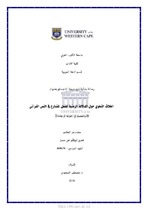| dc.description.abstract | This research discusses the temporality of Al-Fi’l Al-Moḍāri’ (present tense) in
Arabic in terms of structure and case endings. It also focuses on the time of the imperfect
tense and how it is affected by the Adawāt (particles) and justification as well as the
meaning, context and the purpose of the sentence.
The study also investigates the controversial issues on finding a standardized definition of
the actual imperfect tense in order to distinguish it from the outwardly one. It also
investigates the changes which the imperfect tense undergoes when preceded by particles
and how they change the case endings from Mabnī (Indicative) into Mu’rab apocopate (to
be Jussive or Subjunctive). Another focus is investigating the reason why the tense of the
verb that comes after particles of negation, prohibition, justification and denial is always
imperfect not perfect or future, regardless of the context and the purpose of the text, and the
reason as to why this rule applies to all Qur'ānic verses which contradict this rule when
being parsed.
In addition, it uses semiotics to explain the imperfect tense in the Qur'ānic verses and
investigates the effectiveness of applying abstention and assembly to distinguish between
the tense and it's meaning in the Qur'ānic text. This can help to determine the actual time
of the tense in the Qur'ānic text which in turn helps to parse the imperfect tense correctly
and to justify why there is a case ending which contradicts the grammar rules. The correct
parsing of the imperfect tense, including indicative, subjunctive and jussive, will pave the
way for more attempts to rectify the interpretation of the Qur'ānic verses which create
controversy. This can be achieved by presenting the verses which contradict the rules of
parsing, making hypotheses, analyzing them and then parsing them in a logical way utilizing
an analytical approach. | en_US |

